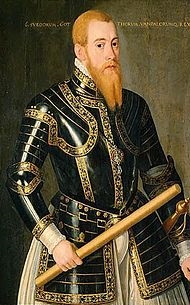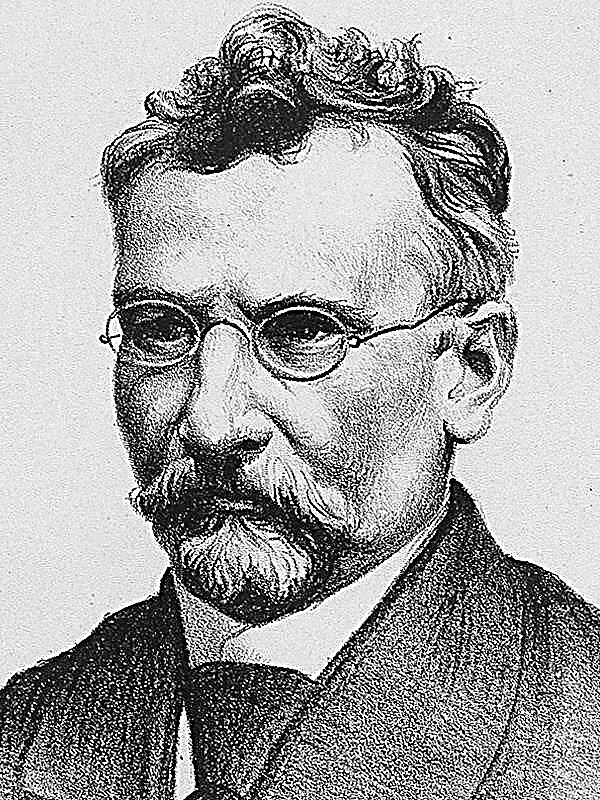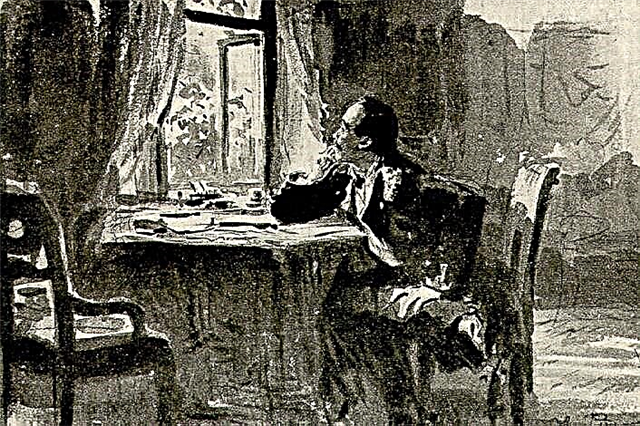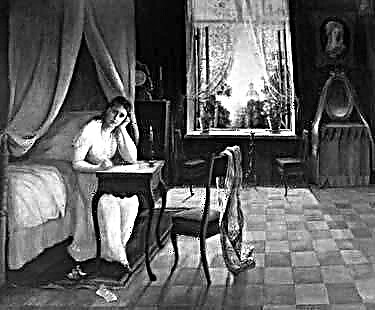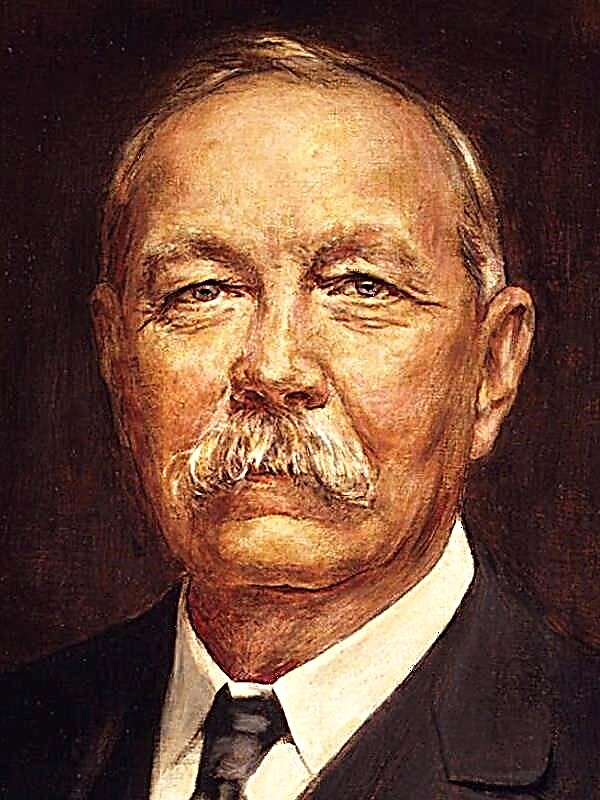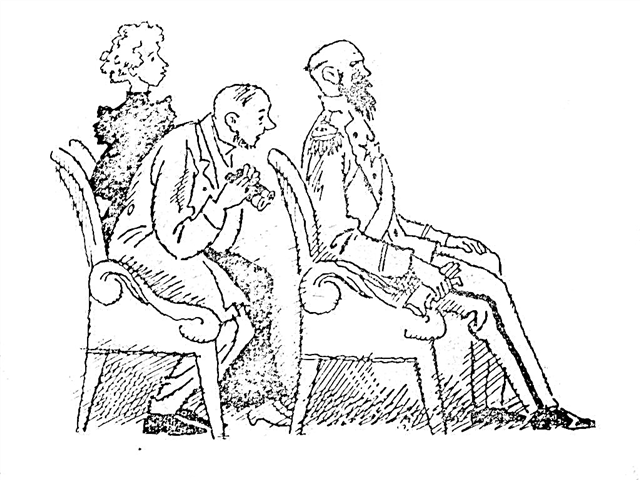The action takes place in the mid 40-ies. XIX century in the county town of Zn-sk. School superintendent Pyotr Mikhailovich Godnev quits with a pensioner, and in his place a certain Kalinovich, a young man who graduated from the law faculty of Moscow University as a candidate, is determined.
Godnev, a good, sociable old man, a widower, lives with housekeeper Palageya Evgrafova, who was once picked up by a sick and poor woman, and her daughter Nastya, a pretty, smart and sensitive girl for twenty years. After the only and unsuccessful attempt to go out into a small county light (at the evening of Generalshevalova, the richest landowner of the province), reading became her only entertainment: "she began to live in some special world filled with Homers, Horace, Onegins, heroes of the French Revolution." Every evening, the Godnev comes to the younger brother of Peter Mikhailovich, a retired captain, with his dog.
Introducing teachers to the new caretaker, Godnev is unpleasantly struck by his arrogance; by the way, Kalinovich pretends not to recognize his classmate - a history teacher.
Kalinovich decides to pay visits to the local nobility and senior officials, but it turns out that there is no such thing in the provinces - they do not accept him at all, or, like in Shevalova’s house, they accept him coldly; only Godnev saw in Kalinovich a young man, alone in a strange city, and called for dinner. Kalinovich stayed with the Godnevs until late, spoke with Nastya about literature and did not get bored. After his departure, Nastya did not sleep for a long time and wrote a new poem, which began like this: “Whoever you are, oh proud man! ..” Since then, Kalinovich goes to the Godnevs every day.
In the school, the new caretaker is trying to put things in order; among other things, a capable and honest, but drinking history teacher becomes a victim of his severity.
One day, Kalinovich receives a letter that amazes him greatly: “It was one of those vital clicks that takes away faith in oneself and makes a person a rag, trash, who sees ahead only the need to live, and why and for what, he himself does not know” . On this day, the Kalinovich tells the Godnevs the story of his life, “constant moral humiliation”: early orphaned, he grew up on bread with a man who had once ruined his father, and was a pestle and a toy for his stupid children; after the death of the “benefactor,” a student, he was already living in complete poverty and starving; after successfully completing the course, he was given this place in the province, where he “should become mired and suffocate”. The last blow - the story of Kalinovich, his first literary experience, was not accepted in a thick journal. The world seems unjust to the young man, and he defends his right to cruelty to the complacent Godnev, who reproaches him for his excessive severity: "I want and will take out on vicious people that I myself carry innocently." Then there is a conversation between Kalinovich and Nastya in private: Nastya reproaches Kalinovich for calling himself unhappy, although she knows that she loves him; Kalinovich, however, admits that "love alone cannot fill the hearts of men, and even more so of my heart, because I <...> are terribly ambitious." A few days later, Kalinovich reads his story with the Godnevs; Pyotr Mikhailovich recalls his old acquaintance, an influential person, and sends him an essay by Kalinovich.
The captain (Uncle Nastenka), who loves her very much, realizes that young people are in an unacceptably close relationship; one night, trying to watch over Kalinovich, he catches a Mediocritian official at the Godnev’s gate, who tries to smear them with tar: Mediocritic once unsuccessfully wooed Nastenka and was jealous of Kalinovich. At the insistence of Kalinovich, the act of Mediocritus is brought to the attention of the authorities; he was expelled from the service, but since then gossip has spread about Nastya in the city.
After some time, the story of Kalinovich appears in the metropolitan magazine; Godny are proud and happy almost more than the author himself. Nastenka’s relatives are only worried that Kalinovich is not in a hurry to get married, but also says out loud that “marrying a calculation is vile, and it’s silly to marry a poor girl from a poor girl.”
New faces begin to take part in the action of the novel: Generalsha Shevalova, a widow, a sick and irritable old woman, her daughter Polina and Prince Ivan, a handsome man of fifty, a swindler and, as you might guess, Polina’s lover. Pauline is exhausted by the stinginess of her mother and the ambiguity of her position; Prince Ivan advises her to marry; Kalinovich seems to him a suitable bridegroom, the only decent person in the city (the prince heard about his literary pursuits from Godnev). Upon learning that Kalinovich was invited to visit the Shevalovs, the very house where she had once been humiliated, Nastenka asks Kalinovich to refuse the invitation, speaks of misgivings; Kalinovich accuses her of selfishness. The Shevalovs Kalinovich is most struck by comfort: "for the children of this century, glory ... love ... world ideas ... immortality is nothing before comfort." Soon Kalinovich reads his story at an evening party with the Shevalovs; they also called Nastya, curious to see Kalinovich’s mistress; the presence of Nastya for Kalinovich is unexpected, he is even ashamed of her non-secular appearance and “indecent” love. At evening, Kalinovich saw the daughter of Prince Ivan, a brilliant beauty, and, not loving Nastenka, fell in love with the princess: “two loves lived in the hero’s soul, which, as you know, is not allowed in any way in novels, but in life <...> occurs on every step. "
The prince invites Kalinovich to live a little in the summer on his estate; The Shevalovs are his neighbors. Once, the prince openly offers Kalinovich to marry the rich bride Pauline and convinces him that an early marriage to the poor will ruin his career. The cynicism of the prince amazes the hero, he refuses to Polina. The conversation, however, had its effect: Kalinovich decides to leave Nastenka and leaves for Petersburg; in order to avoid difficult scenes, he, deceiving Godnevs, announces an engagement with Nastya.
The decision made torments Kalinovich to such an extent that he wants to die. On the way, looking at a fellow merchant, the hero thinks indignantly: “For ten rubles, he’s probably ready to leave ten mistresses, and of course, aspen, than he can explain that in this case a person should suffer.” Despite the anguish, Kalinovich, however, already on the train going from Moscow to Petersburg, gets acquainted with a pretty woman of free behavior, and the author writes: “Here I again have to explain the truth, which is completely not accepted in the novels, the truth that we never < ...> they’re not able to change the woman we love so much as the first time we were separated from her, although we still love her with the same passion. ”
Petersburg - the "grave city" - further enhances the hero’s longing: the editorial staff of the magazine welcomes him more than indifferently, after meeting with Amalchen he feels disgraced, the director of the department, to which Kalinovich has a letter of recommendation from Prince Ivan, does not give him a place; finally, an old friend of Kalinovich, a leading critic of the magazine where his novel Strange Relations was published, dying of consumption, Zykov (Belinsky), does not recognize the hero of literary talent: Kalinovich is too rational.
Kalinovich met, and then made friends with a certain Belavin, an intellectual and a gentleman who “thought honestly and ate well all his life”. In disputes with Kalinovich Belavin exposes the new generation, which has completely lost its “romanticism”, the generation is powerless and does not know how to love; the author notes, however, that in the life of Belavin’s romance, there seemed to be no strong passions and sufferings, while Kalinovich, “for all his practical aspirations, we have been in a truly romantic position for about three years <...> romantics, like people <...> with a stricter ideal <...>, as if they live less and stumble less. "
Unhappy, sick and sitting without money, Kalinovich writes to Nastya, revealing, by the way, the past intention to abandon her. Soon she comes to him - all forgiven, with money borrowed. Her father is paralyzed; Nastya herself, after Kalinovich had not written to her for six months, thought that he had died, wanted to commit suicide, and only the Christian faith saved her. After the story, Nastya Kalinovich, thoughtfully and with tears in her eyes, says: “No, it's impossible to love like that!”
For some time the couple lives quietly and happily; they are hung by Bela-vin, who became friends with Nastya. But soon Kalinovich was tormented by ambition, a thirst for comfort and contempt for himself for his parasitism. Once Kalinovich meets Prince Ivan on the street; the prince again begins to seduce the hero: he is lucky to have dinner at Dussauds and at the magnificent summer house to Polina. Polina’s mother died, and Polina is now very rich, Kalinovich decides: he asks the prince if he can still get married to Polina; the prince undertakes to provide him with the consent of the girl and requires fifty thousand for mediation. The author protects the hero from the reader: “if you blame someone, it’s better than a century ...”
From remorse Kalinovich especially rudely behaves with Nastya before leaving her; at the same time she receives news that her father has passed away.
Young and ugly, Polina passionately falls in love with her fiance, which causes him an overwhelming disgust. Before the wedding, Kalinovich learns from the Chevalovs that both Polina and her mother were lovers of the prince, and he pulled money from them.
Having acquired a state of marriage and connections, Kalinovich finally gets what he always wanted to: a good place, the opportunity to show his abilities. A brilliant investigator stepped out of it; a few years later he becomes vice-governor of the same province where he was once a school superintendent.
Kalinovich “always felt great sympathy for the implementation of the state’s impassive idea, with the possible repulse of all harassment of estate and private”; bureaucratic robbery and lawlessness reigned in the province, and the governor directed everything. In a fierce struggle with bureaucracy and the governor, Kalinovich won a temporary victory. The last major crime discovered by Kalinovich is a forgery committed by Prince Ivan, whom Kalinovich mortally hates; the arrest of the prince restores against Kalinovich all the local nobility.
Kalinovich unexpectedly receives a letter from Nastya: she became an actress, the audience appreciates her talent; their troupe will play in Ensk; she informs her address and looks forward to seeing her: “after ten years <...> this woman again responded, who had some kind of dog affection for him”. Kalinovich joyfully thanks God: “I am not alone now: she will save me from the enemies and villains surrounding me!”
Meanwhile, Polina, who has long hated her husband, secretly visiting the arrested Prince Ivan, goes to Petersburg; she intends to use the same connections that once gave her husband a place in the service, now to destroy her husband and save Prince Ivan.
Kalinovich sees Godneva in Kotzebue's melodrama "Hatred of people and repentance", in the role of Eilalia; under Kalinovich, she plays especially hard and shock the audience. This evening they learn that the governor has been removed and Kalinovich has been appointed acting head of the province. At home, Godnev meets Kalinovich simply, in a friendly manner and with his former love; tells how she lived without him, how she fell in love with Belavin: “We all have not the ability to love just one creature, but we are simply capable of love or not.” Belavin was frightened of a possible romance, not wanting to take responsibility for another person: “You are also selfish, but you are a living person, you have been striving for something for a century, you suffer, finally, you feel either sympathy for people and their known beliefs, or disgust, and now express it in life; and Belavin never ... "
The epilogue says that Polina’s intrigues were a success: Kalinovich “fired for illegal actions”; the prince is acquitted. Soon the prince finally ruins Pauline; unable to withstand this last blow, she died. Kalinovich resigns, marries Nastya and settles with her and her uncle-captain in Moscow, "having joined the party of the dissatisfied." The author refuses to consider the wedding of the protagonists as the happy ending of the novel: Kalinovich, “broken morally, physically ill, decided on a new marriage only because he hoped for nothing more and did not expect anything from life”, and Nastya loved him already "More from the memories."


